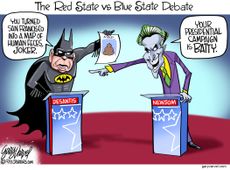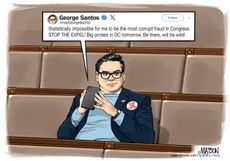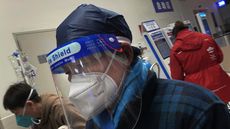The CDC has a new plan to address the health care worker burnout crisis
The program puts the pressure on health care leaders to lift some of the burdens of their employees


Burnout has been a persistent problem for health care workers since before the pandemic, but it is an issue that continues to plague the beleaguered industry. Too often, the responsibility of avoiding burnout is left to workers, but a new campaign from the U.S. Centers for Disease Control and Prevention (CDC) is looking to change that. The recently announced Impact Wellbeing campaign from the CDC's National Institute for Occupational Safety and Health (NIOSH) and the Dr. Lorna Breen Heroes Foundation emphasizes the need for health system leaders to step in to address the root causes of health care burnout.
Why is burnout such a pressing issue for health care workers?
The widespread burnout among health care workers is a crisis that predates the Covid-19 pandemic. But the problem has only gotten worse since then, according to a federal survey of American workers published in October by the CDC. Healthcare workers are feeling burned out more often than before the pandemic "while also struggling with symptoms of anxiety and depression, sleep problems and harassment," The New York Times summarized.
The report compared self-reported data from over a thousand adult workers tracking their mental health symptoms from 2018 to 2022. Compared to other industries, health care workers reported an uptick in the number of poor mental health days they had over a month, from 3.3 in 2018 to 4.5 in 2022. Last year, less than 30% of health care workers described themselves as very happy, also down from 2018. The findings underscored "a dire staffing crisis in the nation’s health workforce," the Times noted. The industry suffered through long hours, high turnover, increased harassment and public backlash over mask and vaccine mandates during the pandemic. In the last few years, medical employees have been leaving their jobs in droves, and others, including scores of nurses and pharmacy workers, have joined large-scale strikes.
Subscribe to The Week
Escape your echo chamber. Get the facts behind the news, plus analysis from multiple perspectives.

Sign up for The Week's Free Newsletters
From our morning news briefing to a weekly Good News Newsletter, get the best of The Week delivered directly to your inbox.
From our morning news briefing to a weekly Good News Newsletter, get the best of The Week delivered directly to your inbox.
One of the things that experts say has created "widespread barriers to seeking help" is the practice of asking potential employees in high-stress environments questions about their mental health history, per Axios. Industry organizations such as the American Medical Association have pushed for the removal of these questions from applications as they might discourage physicians from seeking treatment for a mental illness or substance abuse.
"A lot of people say, 'I can't do that. I can't avail myself of that because otherwise, I'm going to lose my job,'" John Howard, director of NIOSH, told Axios.
What makes the CDC's campaign different than other efforts to alleviate burnout?
The campaign organizers noticed that too many existing initiatives focused on "resilience training," putting the responsibility on workers to cope in toxic work environments., despite evidence that fixing the environments themselves would be a better solution. The CDC survey showed that the odds of getting burned out decreased when the workers "received help from supervisors, had enough time to do their work and trusted management," the Times explained. But experts said the "efforts by medical institutions to address the mental health of their workers have been uneven at best," the outlet added.
The Impact Wellbeing campaign is aimed at helping hospital leaders fill in the gaps with "evidence-informed solutions to reduce healthcare worker burnout, sustain wellbeing and build a system where healthcare workers thrive," per the CDC. Providing individual support resources is a good first step but it is "critical to go beyond encouraging self-care to address the underlying factors that impact healthcare worker wellbeing," the organization added.
The campaign's tools include a questionnaire about workers' well-being and a guide that helps leaders facilitate conversations about their own experiences with mental health care. The program also offers online workshops on supporting work-life balance, veteran life and healthy sleep habits. It also includes a guide from the Dr. Lorna Breen Heroes’ Foundation for removing intrusive questions about mental health history from hospital credentialing applications.
Since the CDC cannot set any federal policies, there won't be any consequences if hospital leaders ignore the campaign. But J. Corey Feist, the foundation's co-founder and CEO, told Stat News that this could actually make it more efficient. The critical part of the campaign is that "it doesn’t wait for a federal law to be passed with a bunch of mandates," Feist said.

Continue reading for free
We hope you're enjoying The Week's refreshingly open-minded journalism.
Subscribed to The Week? Register your account with the same email as your subscription.
Sign up to our 10 Things You Need to Know Today newsletter
A free daily digest of the biggest news stories of the day - and the best features from our website
Theara Coleman has worked as a staff writer at The Week since September 2022. She frequently writes about technology, education, literature and general news. She was previously a contributing writer and assistant editor at Honeysuckle Magazine, where she covered racial politics and cannabis industry news.
-
 Today's political cartoons - December 2, 2023
Today's political cartoons - December 2, 2023Cartoons Saturday's cartoons - governors go Gotham, A.I. goes to the office party, and more
By The Week US Published
-
 10 things you need to know today: December 2, 2023
10 things you need to know today: December 2, 2023Daily Briefing Death toll climbs in Gaza as airstrikes intensify, George Santos expelled from the House of Representatives, and more
By Justin Klawans, The Week US Published
-
 5 hilarious cartoons about the George Santos expulsion vote
5 hilarious cartoons about the George Santos expulsion voteCartoons Artists take on Santa versus Santos, his X account, and more
By The Week US Published
-
 4 tips for protecting your skin during winter
4 tips for protecting your skin during winterThe explainer The temperature drop could make anyone susceptible to dryer skin. Time to switch up your skin care routine.
By Theara Coleman, The Week US Published
-
 China's pneumonia cases: should we be worried?
China's pneumonia cases: should we be worried?The Explainer Experts warn against pushing 'pandemic panic button' following outbreak of respiratory illness
By Keumars Afifi-Sabet, The Week UK Published
-
 How polysubstance abuse is worsening the American opioid crisis
How polysubstance abuse is worsening the American opioid crisisThe Explainer Studies are showing that more Americans are struggling with dependency on multiple substances.
By Theara Coleman, The Week US Published
-
 Kush: the drug destroying young lives in West Africa
Kush: the drug destroying young lives in West AfricaThe Explainer There has been a sharp rise in young addicts in Sierra Leone, Guinea and Liberia
By Flora Neville, The Week UK Published
-
 Why infant mortality is rising
Why infant mortality is risingThe Explainer The infant mortality rate recently rose for the first time in two decades
By Devika Rao, The Week US Published
-
 5 tips for dealing with grief during the holiday season
5 tips for dealing with grief during the holiday seasonThe Explainer Finding your holiday cheer might be more complicated when you're grieving. But it's not impossible.
By Theara Coleman, The Week US Published
-
 Ageing boomers: America’s looming crisis
Ageing boomers: America’s looming crisisUnder the radar A person turning 65 today in US has an almost 70% chance of needing long-term care
By The Week Staff Published
-
 Anastrozole: the daily breast cancer pill tipped to save thousands of lives
Anastrozole: the daily breast cancer pill tipped to save thousands of livesThe Explainer Existing treatment approved for preventative use under 'pioneering' NHS drug repurposing scheme
By Harriet Marsden, The Week UK Published










